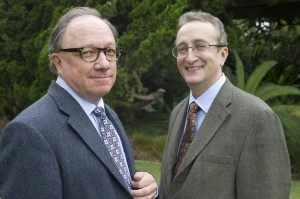Amazon Reviews:
###
[embedplusvideo height=”500″ width=”590″ editlink=”http://bit.ly/1hNoyap” standard=”http://www.youtube.com/v/k7VtYqTMSi8?fs=1″ vars=”ytid=k7VtYqTMSi8&width=480&height=506&start=&stop=&rs=w&hd=0&autoplay=0&react=1&chapters=¬es=” id=”ep7415″ /]
The Directors of the Student Caring Project bring 50 years of combined classroom experience to offer new and experienced teachers ways to thrive in today’s college classroom. Pecoraro and de Roulet focus on understanding the needs and challenges of today’s students, tested methods of successful teaching and class triage, and trends in education. The goal of the book is a rewarding, effective and rigorous experience for students and professors alike.
The first section of the book, Teaching 101, looks at student-professor interactions, discussing:
- The changing landscape of higher education and why many students feel disconnected from their educational experiences.
- A brief outline of the expectations of students today compared to the expectations of professor’s university experiences.
- A look at the financial landscapes that confront students and interfere with learning.
- Academic preparedness.
- The difficulties of teaching in a culture in which negotiation sometimes replaces hard work.
- The importance of establishing clear and wise boundaries with students.
- Establishing and keeping connections with students in the classroom during the semester to improve student learning.
Teaching 102 discusses putting together and nurturing successful courses based on a foundation of care for your students’ academic growth and well-being. Subjects include:
- Intentionally setting the tone and establishing rapport instead of letting the frenetic first days of the term set the tone of a course.
- Reinforcing tone and cementing expectations during the first course meetings.
- The art of effective record keeping to track student progress.
- Learning-goal-oriented course design, organization, and reflection.
- Recognizing symptoms and causes of a class “going bad.” The need to carefully diagnose symptoms, understand student perceptions, and reactions, and see how the symptoms can negatively affect a class.
- Changing the trajectory of a class that has gone off track. Strategies include responding early, checking in with students, not allowing the class to drift from its goals, and building a community of colleagues who are willing to discuss course remedies in confidence.
- Ending a class well. Ways in which students can be actively involved in the end-of-term assessments of their knowledge, understanding, and skills. Preparing for a final course meeting that leaves students both clear about how the course’s goals have been met and confident in seeing how the skills of a particular academic discipline may be applied to their education.
Teaching 103 presents advanced strategies and background for addressing trends and difficult situations in education today, and for helping students succeed:
- Classes that encourage critical thinking and introduce students to the expectations of college academic life.
- The stages of intellectual development most students will experience, and how to appropriately move them along that continuum in preparation for college work and life beyond college.
- Caring for students in online settings, addressing online learning’s additional challenges in knowing one’s audience, fostering community, and keeping a course on track.
- Strategies for addressing difficult student encounters.
- “Career Directions and Your Students’ Daily Bread” introduces students to the idea of a vocation, and discusses practical aspects of entering the work force, internships and apprenticeships, and graduate work.
We are passionate about writing on the topic of “Student Caring!” We have an entire bookshelf of titles in the works.

Professor David C. Pecoraro, M.F.A.
David, a native of southern California, is a first-generation college graduate. While in junior high school, he was introduced to the world of theater and immediately knew he would spend his career there.
His higher education studies began at Fullerton Community College followed by studies at San Diego State University and California State University, Fullerton where he received is B.A. in theater. He completed his education at Temple University, receiving an M.F.A. in theater design and technology.
All of this foreshadowed his career in higher education. He began teaching at Saddleback Community College where he was an adjunct professor and theater production manager for 17 years. This was followed by seven years teaching the graduate program in stage management at the University of California, Irvine. Currently, David is a professor at Vanguard University, a private four-year institution, where he teaches courses in theater and the arts.
David’s professional credits include work as a lighting designer, production manager, and stage manager for countless theatrical productions, the Olympics, a Superbowl halftime show, Disneyland, a Papal visit, and events for the President of the United States.
David’s wife, Michaelene, teaches special education students as an adjunct professor. His oldest son Joseph is in the middle of his undergraduate years and his youngest son Christopher is in the middle of his high school years. When David is not busy with teaching or learning, he goes to the movies and spends time celebrating life with family and friends.
Professor Daniel de Roulet, Ph.D.
Born on the east coast, Daniel quickly realized that he was genetically incapable of playing major league baseball and developed interests in writing and literature. He attended the University of California, Irvine, when it was a small school, gained a B.A. in English and Creative Writing, and entered the world of business to write and make his way.
He met his wife, Teresa, and they both went to graduate school, Daniel gaining a Ph.D. in English Literature at the University of California, Irvine, which was becoming a much larger school. He benefited there from training and experience in teaching, and took a job at North Park College in Chicago, where the winters were cold and long and the colleagues and students we warm and bright. Over the years he has served various institutions as professor of English, chair of departments and faculty committees, Dean of the Undergraduate College, and Associate Provost. He was able to rediscover the classroom full time again as a professor, this time at Irvine Valley College (a community college of about 14,000 students) in southern California.
Daniel has published articles on literature and culture, reviewed books and interviewed authors, and has written a book of his own–but is not the French/Swiss novelist by the same name. They may be related, but if so, are separated by about 300 years.
Daniel’s spouse Teresa returned to school at midlife and is now a family physician. His son Jonathan is in an M.F.A. program for lighting design. Daniel’s second son, Eric, is writing and considering graduate school. His youngest son, Kevin, is in the middle of his undergraduate career. The de Roulets have three cats. Daniel still follows baseball.




